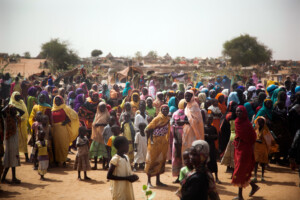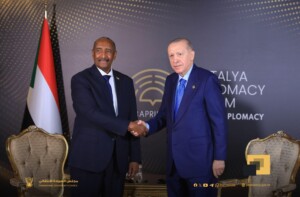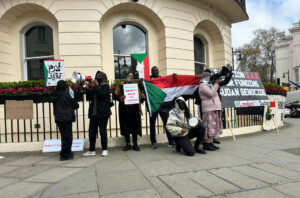Corruption in gold, oil show ‘Sudan’s Deep State’: Enough
An inner circle within Khartoum has privately expropriated oil, gold, and land for self-enrichment and to maintain control through corruption and violence, according to international activists – a “kleptocracy with economic activities that have devastated the Sudanese economy and resulted in underdevelopment”.
An inner circle within Khartoum has privately expropriated oil, gold, and land for self-enrichment and to maintain control through corruption and violence, according to international activists – a “kleptocracy with economic activities that have devastated the Sudanese economy and resulted in underdevelopment”.
Revenues from oil, gold and land allocation in Sudan are often affected by conflict, the report 'Sudan's Deep State', which the Enough project published today, analysed. The US-based watchdog dove into Sudan's oil, gold, land and weapons manufacturing sectors and interviewed Sudanese civil society, academics, and Diaspora members.
The exports of Sudan, a lower middle-income state (2015 GDP of $97.16 billion, according to the World Bank) are mainly driven by oil and gold, and its key sectors are agriculture, industry, and services. But the majority of Sudanese gold is conflict-affected and entails “a high risk for money laundering”.
Gold and oil
The Mineral Resources and Mining Development Act that controls legislation for the mining industry allows for corrupt practices: under this act, owning land does not equate to owning the right of mining. Meanwhile Khartoum's attempts to capture the gold wealth and control exploration sites has caused insecurity, including more armed robberies and gold smuggling by (government-supported) militias in Jebel Amer, Darfur.
The report highlighted that Sudan's incomes from its key oil sector, which has suffered a major loss since the secession of South Sudan in 2011, are used by the regime for political patronage and securing the military support. Elite actors benefited, instead of Sudan's infrastructure, education or public health.
Also land remains a valuable factor in Sudan and has continued to fuel conflict, as federal and local elites and armed groups commit “acts of violence that result in the dispossession of local populations”, Enough found.
Sudan has several times been ranked among the most corrupt states in the world, by Transparency International and World Bank's Control of Corruption. Economic inequality within Sudan contributes to conflict, as it may threaten state stability and keeps more than half of the population in poverty.
Mediation efforts
Enough wrote that current mediation efforts by the African Union High-level Implementation Panel (AUHIP) to end Sudan's armed conflicts and bring peace to the country have not succeeded; “despite 12 rounds of meetings between 2011 and 2016 and the signing of the Roadmap Agreement in August 2016”.
Also the National Dialogue, an initiative of President Al Bashir, did not resolve the country's political issues because opposition parties have boycotted the process. Although the US, UN, and AU have pressed them to join, the parties have characterised the dialogue as the government negotiating with itself.
“Use of financial pressure tools will equip negotiators with the leverage that they need to secure meaningful concessions from the regime toward establishing a lasting peace.”
Enough: “Increased diplomatic engagement can […] counter some of the current difficulties with an African Union peace process that has failed, and the Sudanese National Dialogue that is structurally doomed.”
Policies
To the policy makers in the US, Enough pointed to measures to stop illicit financial flows and anti-money laundering tools, specific steps to address conflict-affected gold, and engagement with Sudan's political and financial supporters. They urged the US government to require transparency of companies conducting business in Sudan to ensure they do not finance the Sudanese kleptocracy.
Before leaving office, former President Barack Obama temporarily lifted several financial sanctions on Sudan despite reported human rights violations and atrocities committed by government forces against civilians across the country, including in Darfur and the Nuba Mountains. In July, the US will again review the sanctions.











 and then
and then